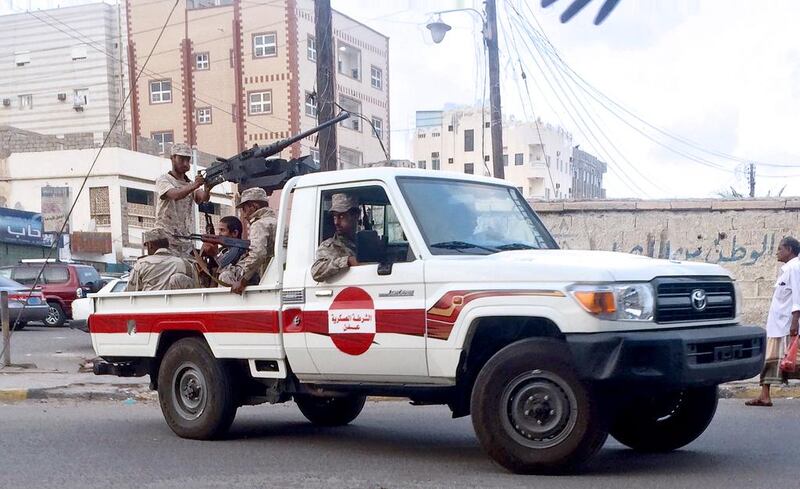ADEN // Troops spread out across Aden province early on Saturday as part of efforts to boost security following a series of attacks by extremists.
Soldiers and police officers patrolled the streets and set up new checkpoints, with the majority of forces deployed to Aden city’s Crater district.
It came after a suicide car bomber targeted the main checkpoint at the western entrance point to Crater on Friday night, killing seven people and wounding eight. The attack was the second suicide bombing to be claimed by ISIL in as many days.
Crater, the commercial area of Aden city, is home to the province's central bank and public bodies, as well as the presidential palace of Abdrabu Mansur Hadi. On Thursday, a suicide bombing claimed by ISIL struck a checkpoint at the palace's main gate, killing eight people.
Troops set up new checkpoints along streets running between Aden's different districts, a source in the province's security office told The National.
“Other troops spread through the streets, manning positions with new military vehicles given to the military and security forces in the province by the UAE,” the source said.
Amid rising concerns over security in Aden, a fresh wave of Saudi-led coalition forces arrived in the city on Wednesday as reinforcement, bringing with them dozens of armoured military vehicles.
A guard at Al Boraiqi port said at the time that most of the troops appeared to be Emirati.
The source in Aden’s security office said security forces had begun to block all non-main roads into the province on Saturday, aiming to force all vehicles to enter Aden via just four roads. Troops stationed at checkpoints along these roads will inspect every car that passes through, he said.
And with many attacks targeting officials carried out by men on motorcycles, Aden’s security office has banned the vehicles from being ridden in the city, and banned their sale, he said, adding that many motorcycles have also been seized.
In addition, intelligence officers will intensify efforts to track extremist groups in Aden to prevent them from carrying out further attacks, the source said.
Aden was liberated from Houthi rebel fighters in July by pro-government resistance fighters backed by a Saudi-led coalition of mainly Arab states that includes the UAE. The coalition is seeking to restore the internationally recognised government led by president Hadi.
Since last October, however, Al Qaeda’s Yemeni affiliate and ISIL have claimed a series of attacks in Aden and earlier this month the authorities imposed a night-time curfew.
Friday night's explosion severely damaged several houses in Crater district, including the home of 38-year-old Akram Al Zawqari. He told The National that his wife and children had been traumatised by the blast.
“We hardly finished the war with the Houthis, and now we are going to enter a new war with the so-called Al Qaeda, which means we will be safe in Aden,” he said.
“I hope that our brothers in the Gulf can help us in stopping the chaos in Aden, so that we can live safely,” rather than “waiting for death”.
foreign.desk@thenational.ae





